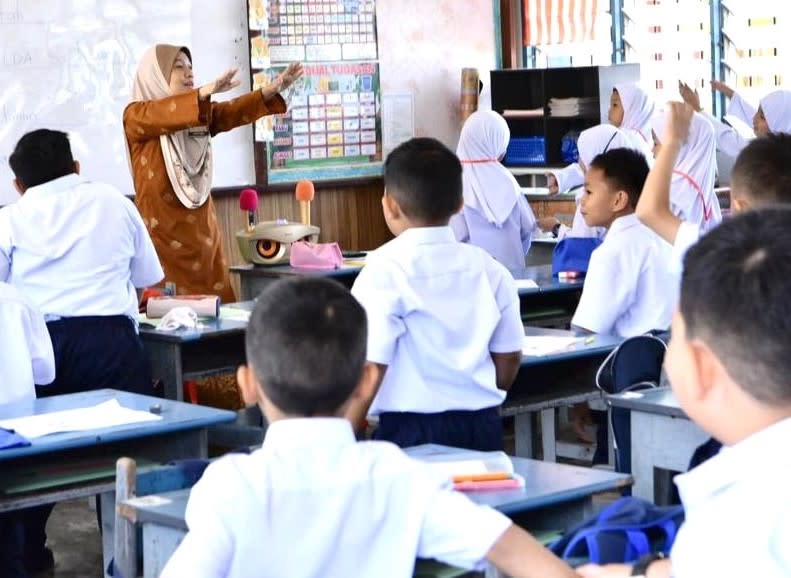Teachers union: Make students fluent in Bahasa Melayu under new Malaysian education plan

The Education Ministry should ensure that school students nationwide are able to speak the national language proficiently, says the National Union of Teaching Profession (NUTP).
This, according to NUTP’s secretary-general Fouzi Singon, should be made part of the proposed ‘Future of Malaysian Education 2026-2036’ plan, which will replace the Malaysian Education Blueprint 2013-2025.
“We have achieved 67 years of independence and there are still many citizens who cannot converse in Bahasa Melayu fluently. Where is our patriotism?” said Fouzi.
“The government had placed emphasis on English (to be a compulsory pass subject for SPM beginning 2016) in the 2013-2025 Education Blueprint. But English is just a second language being taught in schools, similar to Mandarin, German, and French,” he said.
For the record, the 2013-2025 Education Blueprint had set on making English a compulsory pass subject for SPM from 2016. However, the target was later postponed, indefinitely.
While Bahasa Melayu, is a compulsory pass subject for SPM, 2.5 per cent of the 395,870 candidates who sat for the SPM examination in 2023, failed the paper.
Fouzi, whose union represents some 230,000 teachers in Peninsular Malaysia, also said that it was important for the plans laid out in the 2013-2025 Education Blueprint, not be scrapped or ignored.
“Continuity is crucial. It is important to continue incorporating the effective values and concepts from previous educational plans that have proven beneficial to our education system, while refining, or revising those that have not yielded the desired outcomes,” said Fouzi.
Professor Emeritus Datuk Dr Teo Kok Seong, a senior fellow with the National Council of Professors, had previously told Twentytwo13 that key shortcomings of the 2013-2025 plan included the failure to make national schools the preferred choice for students, insufficient emphasis on English proficiency in the SPM exam, and growing ethnic stratification in school enrolments. Teo was one of the architects of the 2013-2025 plan.
Fouzi said that while there were areas in the 2013-2025 plan which had materialised, it was important for the government to look at how to strengthen the quality of Science, Technology, Engineering and Mathematics (STEM) education, make English a compulsory pass subject for SPM, and also focus on improving facilities in schools.
The Education Ministry is calling on the public to contribute suggestions for a new education development plan to replace the Malaysia Education Blueprint 2013-2025. The public can send proposals for the ‘Future of Malaysian Education 2026-2036’ to https://www.moe.gov.my/pelanpendidikan2026/public
On the Dual Language Programme (DLP) in schools, Fouzi said policymakers must determine the real purpose of the programme.
“We do not want a repeat of PPSMI,” he said, of the now-defunct teaching of Mathematics and Science in English programme which was a policy between 2003-2012.
Mooted in 2002, PPSMI was the brainchild of former prime minister Tun Dr Mahathir Mohamad. The policy was aimed at addressing the problems faced by Malaysian graduates who lacked fluency in English, and thus, had poor job prospects. One of the reasons why it failed was due to the English proficiency among the appointed teachers.
“The PPSMI programme was a big failure and we do not want to see a repeat. I believe the DLP programme is all right for selected schools, including special programme, controlled, and boarding schools,” he said.
“But we should not make DLP mandatory for all schools, especially in rural areas. It should be based on suitability, request, and also the demand for such a programme.”
Fouzi added students should not be forced to enrol into the DLP programme.
“Yes, there are schools where all students want to be a part of the DLP programme. But it should not be a situation where some students are forced to transfer to other schools because there is no avenue for them to learn Maths and Science in Bahasa Melayu.”
This, he said, was the rationale of the Education Ministry’s requirement for there to be one class in Year 1, and Form 1 classes to have one non-DLP class teaching Mathematics and Science in BM, beginning 2024.
“But if there is no demand for Maths and Science to be taught in Bahasa Melayu, then there is no need for such a class, as it will be a waste,” he said.
Asked if there was special training given to DLP teachers in school, Fouzi answered in the negative.
“There is no special training or special focus upskilling lessons for teachers to be experts to teach DLP lessons. If a teacher teaching these subjects happen to be good at English, then that’s okay.”
“We have also heard of instances of principals selecting teachers for the DLP programme based on their performance in English for SPM. But this alone does not mean you can teach Maths and Science in English well,” added Fouzi of the DLP programme.
The post Teachers union: Make students fluent in Bahasa Melayu under new Malaysian education plan appeared first on Twentytwo13.


